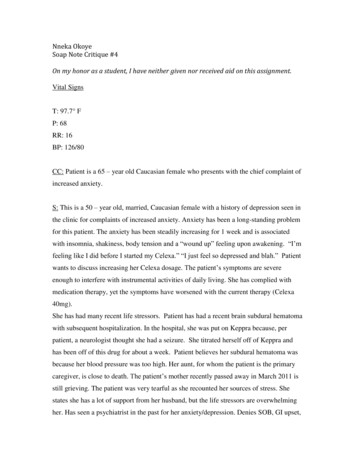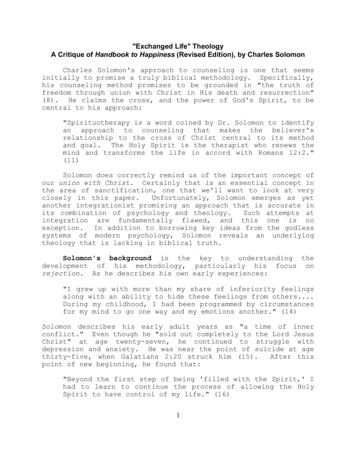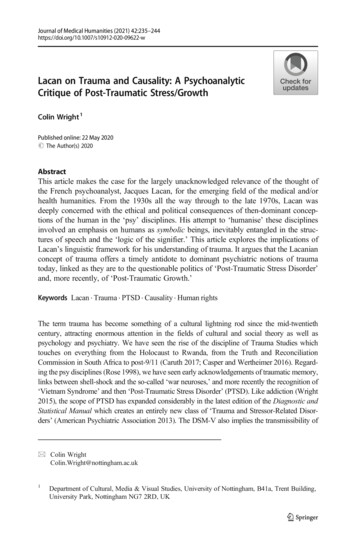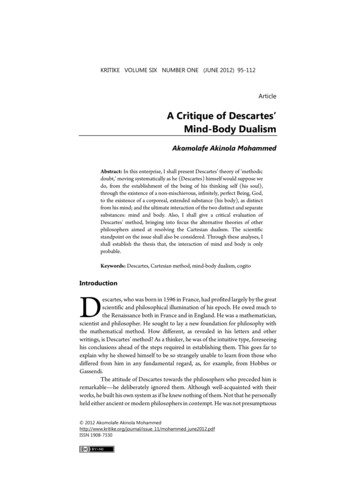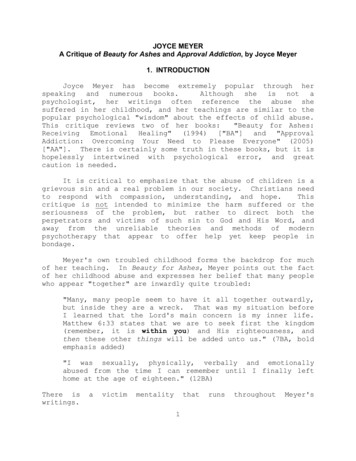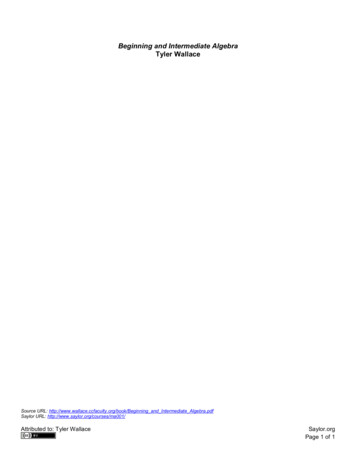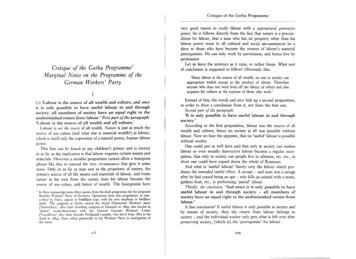
Transcription
ivery good reason to credit labour with a supernatural generativepower; for it follows directly from the fact that nature is a precondition for libour, that a man who has no property other than hislabour power must in all cultural and social ircumstancesbe aslave to those who have become the owners of labour's materialprerequisites. He can only work by permission, and hence live bypermission.Let us leave the sentence as it runs, or rather limps. What sortof conclusion is supposed to follow? Obviously this:Critique of the Gotha Programme1Marginal Notes on the Programme of theGerman Workers' Party'Labour is the source of all wealth a n d culture, and sinceit is only possible to have useful labour i n a n d throughsociety, all inembers of society have a n equal right t o t h eundiminished return f r o m labour.' First part of the paragraph:'Labour is t h e source of all wealth a n d all culture.'Labour is rlot the source of all wealth. Nature is just as much thesource of use-values (and what else is material wealth?) as labour,I\ hich is itself only the expression of a natural power, human labourpower.This line can be found in any children's primer and is correctin so fir as the i rlplicatioizis that labour requires certain means andmaterials. However a socialist programme cannot allow a bourgeoisphrase like this to conceal the very circumstances that give it somesense. Only in so far as man acts as the proprietor of nature, theprimary source of all the means and materials of labour, and treatsnature as his own from the outset, does his labour become thesource of use-values, and hence of wealth. The bourgeoisie have(I)'In thcsc manuscript notes h,larx quotes from the draft programme for the proposedSocialisr II'orkers' Party of Gcrmany. Quotations from this programme, as transcribccl by hlal.x, appcar in boldface type, with his own emphasis in boldfacei trlir.Thc congress at Gotha united the Social Democratic Workers' party('Eiscnachcrs', aftcr their founding congress at Eisenach in 1869, also known as'honest' social-democrats) with the General German Workers' Union('Z.assalleans', aftcr their founder Ferdinand Lassalle, who led it from 1863 to hisclcath in 1864). hlarx refers generically to the Workers' Party in anticipation ofthc union.Critique of the Gotha Programme'Since labour is the source of all wealth, no one in society canappropriate wealth except as the product of labour. Thereforeanyone who does not work lives off the labour of others and alsoacquires his culture at the expense of those who work.'I!iInstead of this, the words and since link up a second proposition,in order to draw a conclusion from it, not from the first one.Second part of the paragraph.'It is only possible t o have useful labour i n a n d throughsociety.'According to the first proposition, labour was the source of allwealth and culture, hence no society at all was possible withoutlabour. Now we hear the opposite, that no 'useful' labour is possiblewithout society.One could just as tire11 have said that only in society can uselesslabour or even socially destructive labour become a regular occupation, that only in society can people live in idleness, etc. etc., inshort one could have copied down the whole of Rousseau.And what is 'useful' labour? Surely only the labour which produces the intended useful effect. A savage - and man was a savageafter he had ceased being an ape - who kills an animal with a stone,gathers fruit, etc., is performing 'useful' labour.Thirdly: the conclzrsion: 'And since it is only possible t o haveuseful labour i n a n d through society - all m e m b e r s o fsociety have a n equal right t o t h e undiminished return f r o mlabour.'A fine conclusion! If useful labour is only possible in society andby means of society, then the return from labour belongs tosociety - and the individual worker only gets what is left over afterpreserving society, [which is] the 'prerequisite' for labour.209
Critique of the Gotha ProgrammeIn fact, this proposition has been useful to apologists rthe prevailing conilitions in s o c i e at any given time. First come the claimsof the government and everything that goes along with it, since itis the agency in society maintaining social order; then come theclaims of property owners of different types, because the differenttypes of private property are the foundation of society, etc. We seehow hollow phrases such as these can be turned and twisted at will.The first and second parts of the paragraph have some kind ofintelligible connection only in this sense:'Only as social labour', or what is the same thing, 'in and bymeans of society', 'does labour become the source of wealth andcultural advantages'.This proposition is indisputably correct, for although isolatedlabour (given the material conditions) can create use values, it cancreate neither wealth nor cultural advantages.But this proposition is also equally indisputable:'To the degree that labour develops in society, and in that waybecomes the source of wealth and cultural advantages, poverty anddestitution also develop amongst the workers, but wealth and cultural advantages [develop] amongst the non-workers.'This has been the rule in all history up to now. Instead of generalising about 'laboztr' and 'society', this was the place to demonstrate how in present-day capitalist society the material etc. conditions have finally been created that will render workers capableof lifting this historical curse, and compel them to do it.In fact, the whole paragraph, defective in both style and content,is only there to inscribe Lassalle's catch-phrase 'undiminishedreturn from labour' as a motto on the party banner. Later I shallcome back to the 'return from labour', 'equal right' etc., since thesame subjects recur in somewhat different form.(2) 'In m o d e r n society the m e a n s o f labour a r e a monopolyof the capitalist class; the resulting dependency o f t h eworking class is t h e cause o f poverty a n d servitude i n whatever form.'This sentence, borrowed from the rules of the International[Working-h'len's Association], is falsified in the 'improved' versionhere.In modern society, the means of labour are a monopoly of landowners (the monopoly of landed property is the very basis of theCritique of the Gotha ProgrammeImonopoly of capital) and of the capitalists. In the relevant passagethe rule of the International mentions neither the one nor the otherclass of monopolists. It speaks of a 'monopoly of the means of labour,i.e. of the sources of life'; the addition of 'sources oF.lifel is sufficientindication that land is included in the means of labour.T h e amendment was made because Lassalle, for reasons nowgenerally known, tackled on41 the capitalist class, not the owners oflanded property. In England the capitalist is usually not the ownerof the land on which his factory stands.(3) 'The emancipation o f labour requires t h e elevation oft h e m e a n s o f labour to t h e c o m m o n stock of society, t h eco-operative m a n a g e m e n t o f all labour, with a just distribution o f t h e return.''Elevation of the means of labour to the common stock!' This isbetter rendered as their 'transformation into common stock'. Butthis is only in passing.What is the 'return fvom labour'? T h e product of labour or itsvalue? And in the latter case, is it the total value of the product,or only the value newly added by labour to the value of the meansof production as they are consumed?'Return from labour' is a loose notion used by Lassalle insteadof precise economic concepts.What is a 'just' distribution?Don't the bourgeoisie claim that the present distribution is 'just'?And on the basis of the present mode of production, isn't it in factthe only 'just' distribution? Are economic relations regulated bylegal concepts, or on the contrary, don't legal relations arise fromeconomic ones? Don't sectarian socialists have the most varied ideasabout 'just' distribution?T o find out what the phrase 'just distribution' was supposedto mean in this context, we must take the first paragraph togetherwith this one. T h e latter presupposes a society in which 'themeans of labour are common property and all labour is cooperatively managed', and from the first paragraph we gatherthat 'all members of society have an equal right to the undiminished return from labour'.'All members of society'? Even the non-workers? Then where's'the undiminished return from labour'? Only the working membersof society? Then where's 'the equal right' of all members of society?
Critique of the Gotha ProgrammeCritique of the Gotha Programme'All members of society' and 'equal right' are obviously just figures of speech. The nub of the matter is that in this communistsociety every worker has to get his 'undiminished return fromlabour', as Lassalle would have it.Let's start by taking the term 'return from labour' to mean 'product of labour', so the co-operative return from labour is the totalsocial prortucl.Now to be deducted from this:First: funds to replace the means of production [as it is] used up;Secolzdly: additional resources to expand production;T / r day reserve:or insurance against accidents, disruptions dueto natural catastrophe etc.These deductions against the 'undiminished return from labour'are an economic necessity, and the amounts will be determined by thematerials and resources available, and in part by actuarial reckoning,but they are in no way calculable through principles of justice.Then there's the remaining part of the total product, destined toserve as the means of consumption.But before this gets down to individual portions, there are furtheroutgoings:First: the genernl nriministrative costs not directly linkcd toprorl lclio z.In comparison with present-day society, this part will be verysignificantly restricted from the outset, and it will diminish proportionately as the new society develops.Stio? dl l':iohntever is (tedicateil to the collective satisfactiolz o f needs,like schools, health services etc.In comparison with present-day society this part will expand significantly from the outset, and will grow proportionately as the newsociety develops.Thirrlly: resources j i r those ilzcapable of work etc., shorthand forwhat today comprises so-called official poor relief.Only now do we come to 'distribution', which is the only thingconsidered in this narrow-minded programme, influenced as it isby Lassalleans, to wit, the part of the means of consumption whichis distributed amongst the individual producers in the co-operative.The 'undiminished return from labour' has already been secretlycon\,ertell into the 'diminished [return from labour]', although whatis extracted from the producer in his role as private individualcomes back to him directly or indirectly in his role as member ofsociety.T h e general term 'return from labour' now vanishes, just the waythe term 'undiminished return from labour' disappeared.Within a co-operatively organised society based on common ownership in the means of production, the producers do not exchangetheir products; nor does the labour expended on the productsappear any more as the value of these products, one of the materialproperties that they possess, because now in contrast to capitalistsociety, the labour of individuals will no longer be a constituentpart of the total labour in a roundabout way, but will be part of itdirectly. The term 'return from labour', which is useless even todayon account of its ambiguity, thus loses all semblance of meaning.Here we are dealing with a communist society, not as it has developed from first principles, but on the contrary, just as it emerges fromcapitalist society, hence in every respect - economically, morally,intellectually - as it comes forth from the womb, it is stamped withthe birthmarks of the old society.T h e individual producer retains proportionately, after deductions, exactly what he put into it. What he has put into it is aquantity of his individual labour. E.g. the working day for societycomprises the sum of individual hours of work. T h e individuallabour time of the individual producer is the part of the workingday in society contributed by him, his share of it. He gets fromsociety a receipt that he has contributed such and such an amountof labour (after a deduction of labour for common reserves) andwithdraws from society's stores of the means of consumption anequal amount costed in labour terms. The same quantity of labourhe puts into society in one form comes back to him in another.Obviously the principle here is the same as the one that appliesin the exchange of commodities, so far as the exchange is one ofequal values. The content and form have changed, because underthe altered conditions no one can contribute anything except hisown labour, and nothing can become a person's property except theindividual means of consumption. But as far as the distribution ofthe means of consumption amongst individual producers is concerned, the operative principle is the same as under the exchangeof equivalent values: a given amount of labour in one form isexchanged for an equal amount in another form.
Critique of the Gotha ProgrammeCritique of the Gotha ProgrammeThus equal I-ighfis still - at least in principle - a bourgeois right,although principle and practice are no longer at loggerheads, andanyway in commodity exchange the exchange of equivalents existsonly on average, not in each individual case.In spite of this advance, this eqtral right is continually beset withbourgeois limitations. The right of the producers is proportional tothe labour they contribute; the equality consists in measurement interms of a common standard, labour. But one person is physicallyor mentally superior to another, and hence contributes more workin the same time or can work longer; and labour, in order to serveas a measure, must be defined by its duration or intensity; otherwiseit would cease to be standard. This equal right is an unequal rightfor unequal labour. It acknowledges no distinctions of class, becauseeveryone is a worker just like everyone else, but it tacitly recognisesunequal individual talent and hence productivity in labour as natural privileges. Therefire 111 content this is a rjght to inequality, like allrights. By its nature a right can only consist in the application of acommon standard; but unequal individuals (and they would not bedifferent individuals if they were not unequal) are only commensurable in terms of a common standard, if they are brought within acommon purview, grasped only in terms of a specific aspect, e.g.considered in a given case only as workers, and nothing else aboutthem is taken into account, all else being disregarded.Furthermore: one worker is married, another not; one has morechildren than another, etc. etc. Given equal productivity and hencean equal share in the socialised resources for consumption, oneworker will in fact receive more than another, be richer thananother. T o avoid all these faults, rights would have to be unequal,instead of equal.But these faults are unavoidable in the first phase of communistsociety when it has just emerged from capitalist society after a longand painful birth. Rights can never be higher than the economicform of society and the cultural development which is conditionedby it.In a higher phase of communist society, after the subjection ofindividuals to the division of labour, and thereby the antithesisbetween mental and physical labour, has disappeared; after labourhas become not merely a means to live but the foremost need inlife; after the multifarious development of individuals has grownalong with their productive powers, and all the springs of cooperative wealth flow more abundantly - only then can the limitedhorizon of bourgeois right be wholly transcended, and society caninscribe on its banner: from each according to fiis abilities, to eachaccording to his needs!I have engaged at length with the 'undiminished return' fromlabour on the one hand, and with Lequalright' [and] 'just distribution' on the other, in order to show how outrageous it is that, onthe one hand, people want to make party dogma out of conceptionswhich made sense at a certain point, but are now a junkheap ofphrases, [and] on the other hand, people twist the realistic outlook,adopted by the party with much effort and now well rooted there,into an ideology of rights-and-so-forth, just the arrant nonsensecommon amongst democrats and French socialists.Quite apart from the analysis so far, it was an overall mistake tomake an issue of so-called distribution and to make it the focus ofattention.At any given time the distribution of the means of consumption is only a characteristic feature of the very distribution ofthe conditions for production; the latter distribution is a consequence of the mode of production itself. T h e capitalist mode ofproduction, for instance, is founded on the fact that the materialconditions for production are assigned to non-workers in theform of property in capital and land, whilst most people ownonly the condition of production that is personal, labour power.If the elements of production are distributed in this way, thenthe present distribution of the means of consumption arises byitself. If the material conditions for production are the cooperative property of the workers themselves, then a distributionof the means of consumption arises that is different from today's.Vulgar socialism has taken from bourgeois economists the analysisand theorisation of distribution as independent of the mode ofproduction (and some of the democrats got this in turn from thesocialists), hence they represent socialism as turning mainly onquestions of distribution. Given that the real relationship wasclarified long ago, why are we going backwards again?(4) 'The emancipation o f labour m u s t b e t h e work of t h elabouring class, against which all other classes a r e onljf areactionary mass.'
Critique of the Gotha ProgrammeCritique of the Gotha ProgrammeThe first clause is from the introduction to the rules of the International, only 'improved'. Originally it read: 'The emancipation ofthe labouring class must be the work of the labourers themselves';here by contrast 'the labouring class' is to emancipate - what? 'labour'. Rlake sense of that, if you can.In compensation, the contrasting clause is a quote from Lassallein purest form.'against which (the labouring class) all other classes a r e onlyu reuctionarjr nzass. ''I'he Communist Manifesto says:'Of all the classes which today oppose the bourgeoisie, the only r u l yrez olutionar class is the proletariat. The other classes come tothe fore and then decline to extinction with large-scale industry,whereas the proletariat is its particular product.''The bourgeoisie is understood here to be a revolutionary class [he bringer of large-scale industry - contrasting with the feudalestates and lower middle classes, which want to retain the wholesocial hierarchy, the product of outdated modes of production.Iience they do not form merely a reactionary mass together with theboutgeoisie.In contrast to the bourgeoisie, the proletariat is indeed revolutionary, because having arisen from large-scale industry, it isstri\:ing to strip production of its capitalist character, which thebourgeoisie seeks to perpetuate. But the [Communist] Manifestoadds: that the 'lower middle classes . . . (become) revolutionary. . . because they recognise that they face a descent into theproletariat'.From this point of view it is therefore nonsense once again [tosay] that they [the lower middle classes], 'together with the bourgeoisie' and the feudal estates to boot, form 'only a reactionarymass', in contrast to the labouring class.At the last elections, did we say to the artisans, small manufacturers, etc. and peasnnls: are you, along with the bourgeoisie andfeudal estates, just a reactionary mass, compared to us?Lassalle knew the Co
T/ rdy: a reserve or insurance against accidents, disruptions due to natural catastrophe etc. These deductions against the 'undiminished return from labour' are an economic necessity, and the amounts will be determined by the materials and
